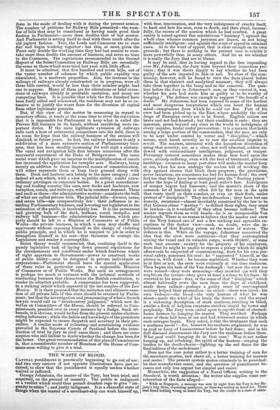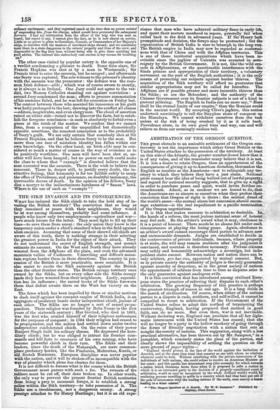THE WASTE OF BLOOD.
CAPITAL punishment is practically beginning to go out of use ; and two very curious if not opposite illustrations have just oc- curred, to show that the punishment is equally useless whether waived or inflicted.
George Johnstone, the master of the Tory, has been tried, and acquitted? on the ground of insanity. The public is indignant at a verdict which could thus permit drunken rage to give "im- punity to crime " ; and justly indignant. It is a shameful state of things when the master of a merchant-ship can work himself up,
with fear, intoxication, and the very indulgence of cruelty itself, to hack and hew his men, even to death, and then plead, success.. fully, the excess of the passion which he had courted. A great outcry is raised against this mischievous " leniency "; against the whole class whence common jurymen are drawn, as not being sufficiently intelligent ; and against the want of appeal in criminal cases. As to the want of appeal, that is clear enough on its own grounds ; but there is nothing in the present case to exhibit it more powerfully than in many others. And let us see whether it is really the Jury that are to blame.
It may be said, that in having regard to the fate impending over Mr. Johnstone, the Jury went beyond their immediate pro- vince • that it was theirs simply to say whether he had, been guilty of the acts imputed to him or not. No class of the com- munity, however, will be found to view the facts placed before them in that abstract and analytical manner ; they will always take them together in the lump and in the concrete. The ques- tion before the Jury in Johnstone's case, as they viewed it, was, whether his acts had made him so guilty as to be worthy of hanging ? The defence was enough to suggest " the benefit of a doubt.' Mr. Johnstone had been exposed to some of the hardest and most dangerous temptations which can beset the human mind—temptations from which he could not flee. Part of his crew had been picked up in the East, where probably the vilest dregs of European crews are to be found. English sailors are brave and not bad-hearted ; but their condition is rude : they are ignorant, prone beyond any class in the world to indulgence of every impulse, brutal under provocation : it is a maxim that holds among a large portion of the commanders, that the men are only to be kept under control by terror and " discipline,"—which means, such harsh severity as to cow the smallest impulse to revolt. The masters, intrusted with the hazardous discretion of using that severity, are, as a class, not well educated, seldom en- dowed with extraordinary intelligence, judgment, or temper. Pecuniary interest sometimes makes them bear hard upon the crew, already suffering, even with the best of treatment, grievous hardships : aversion to incur port-dues will make the master keep at sea, when his men undergo the useless toil of working. the ship against storms that block their progress ; the provisions, never luxurious, are sometimes too bad for human food ; the crew feel too that they have been entrapped into the " floating prison " under the hope of finding at least good sailor's fare. Indulgence of temper begets bad humours; and the master's share of the common lot of hardship is often felt by the men in the spite that vents itself on their comfort, or even on their flesh, under pretext of " discipline." They are defenceless ; they have but one remedy, resistance—almost inevitably construed by the law to be that heinous crime "mutiny ": to defend their rights, they must be lawless—is it wonderful if they often become ruffians ? The master regards them as wild beasts—be is an irresponsible Van Amburgh. There is no reason to believe that the master and crew of the Tory formed one of not a few striking and agreeable ex- ceptions to this darker view—such, no doubt, were the in- habitants of that floating prison on the waste of waters. The defence is this. While on the voyage, Johnstone conceived the idea that the crew were mutinous—that they contemplated seizing the vessel and its valuable cargo, worth 80,0001., or some such vast amount : anxiety for the property of his employers, fears that he might be unable to repress a piracy which he might afterwards be suspected of countenancing, fears for his own per- sonal safety, possessed his soul : he " supported " himself, as the phrase is, with drink : he became maddened. Whether they were so at first or not, the crew were evidently at one time mutinous. Then began the task of the Van Amburgh : but now the crew too were roused—they were menacing—they scowled (as well they might) on the tyrant—they gave at least a colour to his fears : he resorted to his arms—fear, or the sense of that " discipline" which almost habitually cows the men from the days of childhood, made them submit—perhaps a guilty sense of contemplated mutiny helped their prostration : he struck—there was blood : his own violence—the blood—the very horrors of what he was about—made the whirl of his brain the fiercer ; and the sequel is a sickening description of stark madness, revelling in blood, amidst a flock of helpless creatures stricken stupid by terror and perplexity. The Jury were called upon to cap the feast of charnel- house horrors by hanging the master. They revolted. Perhaps some of them had been at sea and had witnessed scenes in which such outrages begin. They asked, is this the treatment that such a madman needs ?—for, however his madness originated, he was as mad as Lucy of Lammermoor before he had done; and in his dull diseased countenance the Jury saw the madman before them. What good could hanging do in that case ? Was it not rather keeping up, not rebuking, the spirit of the horrors—singing the burden to the death-chorus—lighting up the red flame for the final tableau of the melodrama ?
Does not the case point rather to a better training of men for the merchant-marine, and above all, a better training for masters and mates? The present system makes criminals to be punished: let that manufacture cease, and the question of punishment be- comes not only less urgent but simpler and easier.
Meanwhile, the suggestion of a Naval Officer, writing to the Standard, is worth attention : the writer also supplies some cor- roboration of the facts alleged— "While at Singapore, a message was sent by night from the Tory to her Ma- jesty's brig Siren, requesting assistance' as there was mutiny on board her. Those sent found nothing wrong on board the Tory, but the master in a state of extra- Ordinary excitement: and they regretted much at the time that so power existed of suspending him from his charge, which would have prevented the subsequent
ors. I had my information from the officer of the brig who was sent on board; but regret to say, I cannot give the date, as be is now absent on service. Little or no power is given to Governors, Consuls, or Commanders of her Majesty's ships, to interfere with the masters of merchant-ships abroad; and we sometimes meet them in a state dangerous to the owners' property and lives of the crew, and disgraceful to the flag they bear, without being able to give them anything but goa i advice. The interest this melancholy case excites is my excuse for troubling
ono
The other case visited by popular outcry is the opposite one of a verdict condemning a prisoner to death. Some time since, Sir Francis Hopkins was shot at by a man in Westmeath; Sir Francis tried to seize the assassin, but he escaped ; and afterwards one Seery was captured. The sole witness to the prisoner's identity with the assassin was the prosecutor : the defence was the com- mon Irish defence—alibi ; which was of course sworn to stoutly, as it always is in Ireland. One Jury could not agree to the ver- dict, two Roman Catholics standing out against conviction : a second Jury.condemned the man ; efforts to procure commutation of his sentence failed, and he was left for execution on Friday last. The contest between those who asserted his innocence or his guilt was hotly prolonged to the last; drawing into the conflict all classes —editors, magistrates, and even clergymen. The cloud of assertion raised on either side—raised not to discover the facts, but to estab- lish the foregone conclusion—is such as absolutely to forbid even a guess at the truth of the matter. We confess that we cannot form, from a comparison of the unqualified but diametrically opposite assertions, the remotest conception as to the probability of Seery's guilt. We are only certain that somebody shot at Sir Francis Hopkins, and that he believes Seery to be the man. But more than one case of mistaken identity has fallen within our own knowledge. On the other hand, an Irish alibi may be con- sidered so much a matter of course in the way of evidence as to be positively worthless. One man will have been shot at, an- other will have been hanged ; but no power on earth could make the class to whom that " example" is directed believe that the man executed was the assassin. There is the wish to believe him innocent. There is, deeper still, to justify every doubt, the in- stinctive feeling, that humanity is far too fallible safely to usurp the office of Providence, and pronounce, on doubtful testimony, the irrevocable decree of death. In the opinion of his fellows, Seery dies amartyr to the indiscriminate harshness of " Saxon" laws. Where is the use of such an " example"?



























 Previous page
Previous page